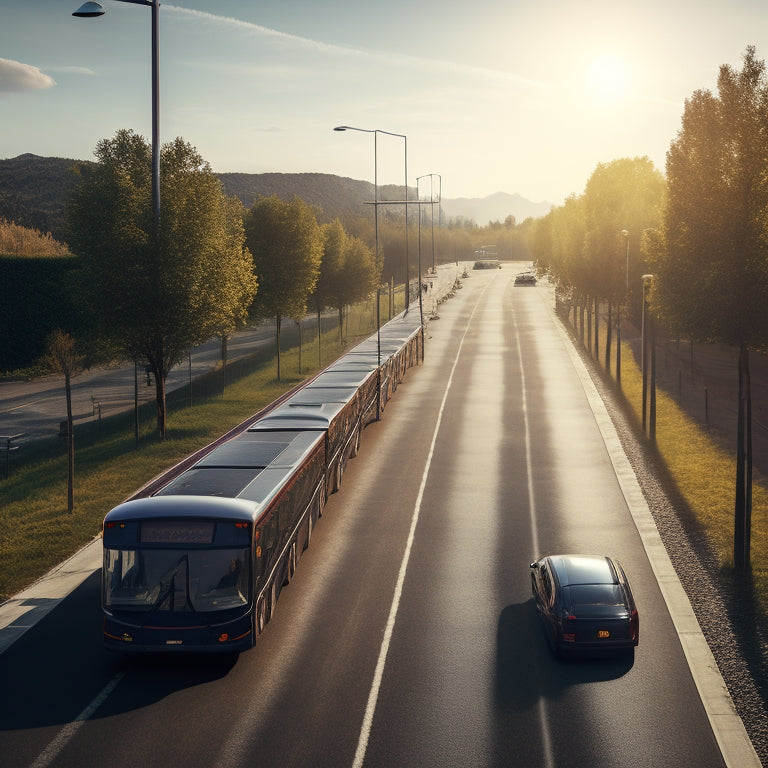
What's the Average Cost of Bus Solar Installation?
Share
When considering a bus solar installation, you're likely wondering about the cost. On average, the total cost can range from $15,000 to $30,000, depending on factors like the size and complexity of the energy system, panel quality, and installation expertise. This significant investment includes the cost of solar panels, mounting hardware, installation labor, energy storage solutions, and warranties. As you weigh the benefits of reducing your carbon footprint and operating costs, you'll want to explore the finer details of bus solar installation costs and how to maximize your return on investment.
Key Takeaways
• The average cost of bus solar installation ranges from $15,000 to $30,000, depending on system size and complexity.
• The cost includes solar panels, mounting hardware, installation labor, energy storage solutions, and panel warranties.
• The quality and efficiency of solar panels, expertise of the installation team, and local policies also impact the overall cost.
• A vital component of the cost is the energy storage system, which provides backup power and increases energy independence.
• Proper maintenance of the solar panels and energy storage system is crucial to maximizing the return on investment and reducing operating costs.
Understanding Bus Solar Panel Costs
When evaluating a solar installation on your bus, one of the key factors to assess is the cost of solar panels, which can vary greatly depending on the type, quality, and quantity of panels needed to meet your energy requirements.
You'll want to take into account the upfront cost of the panels, as well as the cost of installation, mounting hardware, and other components. Additionally, you should factor in the cost of Solar Maintenance, which will be essential to guarantee the longevity and efficiency of your solar system.
It's also important to contemplate Energy Storage solutions, such as batteries, to store excess energy generated during the day for use at night or during periods of low sunlight.
Factors Affecting Solar Installation Price
Your solar installation price is heavily influenced by several key factors, including the size and complexity of your bus's energy system, the quality and efficiency of the solar panels, and the expertise of the installation team. These factors can greatly impact the overall cost of your solar installation.
For instance, a larger energy system with high-efficiency panels will likely cost more than a smaller system with standard panels. Additionally, the installation team's level of expertise and experience can affect the final price.
Other factors that can influence your solar installation price include local and federal policies. Local incentives, such as tax credits or rebates, can help reduce the upfront cost of your solar installation. Federal policies, like the Solar Investment Tax Credit, can also provide significant savings.
Moreover, the installation location and local building codes can also impact the final cost. Understanding these factors is important in determining the average cost of bus solar installation.
Breakdown of Solar Panel Expenses
The cost of solar panels can be broken down into several components, including the price of the solar panels themselves, the mounting hardware, and the installation labor costs, which together account for the majority of the overall expense. As you contemplate investing in a bus solar installation, understanding these individual costs is essential.
The solar panels themselves typically account for around 40% of the total cost, with high-efficiency panels typically costing more. Mounting hardware, such as brackets and tracking systems, adds another 10-15% to the total. Installation labor costs, including the expertise and time of the installation team, make up around 30-40% of the total.
Additionally, you'll want to take into account the cost of energy storage solutions, such as batteries, which can add to the overall expense. Don't forget to factor in panel warranties, which can provide peace of mind and protect your investment.
Average Cost of Bus Solar Systems
On average, you can expect to pay between $15,000 and $30,000 for a bus solar system, depending on the size and complexity of the installation. This cost includes the solar panels, mounting hardware, inverters, and energy storage systems.
The energy storage system, which typically includes batteries, is a vital component of a bus solar system, as it allows you to store excess energy generated during the day for use at night or during periods of low sunlight.
Proper battery maintenance is important to guarantee the longevity and efficiency of your energy storage system. Regular checks and maintenance can help prevent battery degradation and ensure peak performance.
Additionally, a well-designed energy storage system can provide a backup power source in case of grid outages or other emergencies, enhancing the safety and reliability of your bus solar system.
When considering a bus solar system, it's crucial to factor in the costs of energy storage and battery maintenance to ensure a safe and efficient installation.
Maximizing ROI on Solar Investment
To maximize your return on investment (ROI) in a bus solar system, you'll want to optimize the system's performance, guaranteeing it generates the most electricity possible while minimizing costs. This necessitates regular Solar Maintenance to ensure the system operates at peak efficiency.
Regular cleaning, inspecting connections, and monitoring performance will help identify potential issues before they impact energy production.
Additionally, consider investing in Energy Storage solutions to maximize your ROI. Energy Storage systems allow you to store excess energy generated during the day for use during periods of low sunlight or at night, reducing your reliance on traditional fuel sources.
This not only increases your energy independence but also reduces your operating costs.
Frequently Asked Questions
Can I Install Solar Panels on an Older Bus Model?
'You're wondering if you can install solar panels on your older bus model, but beware: retrofitting challenges await, and vintage compatibility issues might arise - careful planning is essential to guarantee a safe, successful installation.'
Are There Any Government Incentives for Bus Solar Installations?
You can benefit from government incentives for bus solar installations, including the 30% Tax Credit Benefits and Federal Rebates, which can greatly reduce your upfront costs, making sustainable energy more accessible and safe for your transportation needs.
How Long Does a Typical Bus Solar Installation Take?
You'll typically spend 2-5 days on a bus solar installation, depending on the system's complexity and labor costs, with a team of 2-3 experts working on the installation timeline to guarantee a safe and efficient process.
Can I Finance My Bus Solar Installation Through a Loan?
"Ha! You think solar panels are expensive? Wait till you see the loan options! You can finance your bus solar installation through a loan, but be prepared for lenders to scrutinize your credit score."
Do Solar Panels Affect the Bus's Fuel Efficiency?
You're wondering if solar panels affect your bus's fuel efficiency. The answer is yes, but minimally. Solar panels can reduce energy consumption, leading to energy savings, but may marginally impact performance, depending on panel placement and weight distribution.
Related Posts
-

Why Choose Cool Roofs in Scorching Climates?
You opt for cool roofs in scorching climates because they enable you to reclaim control over your energy consumption ...
-

3 Earth-Loving Furniture Tips for Energy-Smart Homes
When furnishing your energy-smart home, you have the power to reduce your carbon footprint greatly by making consciou...
-

7 Top HEPA Filters for Green Building Projects
You need a reliable HEPA filter for your green building project that aligns with your sustainable goals and guarantee...


